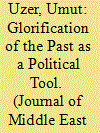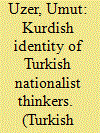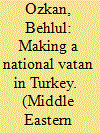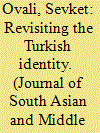| Srl | Item |
| 1 |
ID:
163738


|
|
|
|
|
| Summary/Abstract |
Turkey’s radical transformation of state and society under Mustafa Kemal Atatürk’s republican rule (1923–1938) has been subject to a gradual revision under the Justice and Development Party (AKP) government since 2002. The creation of a new state identity has been buttressed with Islamic and Ottoman discourses, which entail a reinterpretation of Ottoman history. This study analyzes the changes in modern Turkey in the last sixteen years within the context of the use of the Ottoman past in the formation of a new national identity by the AKP government.
|
|
|
|
|
|
|
|
|
|
|
|
|
|
|
|
| 2 |
ID:
120764


|
|
|
|
|
| Publication |
2013.
|
| Summary/Abstract |
This article purports to study the national identity of two influential ideologues of Turkish nationalism, Ziya Gökalp and Ahmet Arvasi, their approach to Kurds and their rejection of such affiliations regardless of their background in a predominantly Kurdish milieu. Their worldviews were strikingly different regarding social matters but they both shared a common view regarding the hegemonic position of Turkish identity even in a Kurdish-majority region.
|
|
|
|
|
|
|
|
|
|
|
|
|
|
|
|
| 3 |
ID:
130744


|
|
|
|
|
| Publication |
2014.
|
| Summary/Abstract |
The concept of homeland, vatan, the essential part of the nation-state establishing the link between the people and the territory, territorializes the national identity by creating a sense of belonging to the sacred soil and turning the imagined boundaries into physical ones. In Turkey, constructing the borders of the national identity and vatan required the transformation of the Ottoman imperial paradigm into a nation-state. Republican reforms were unprecedented in terms of combining Turkish identity with territoriality. With the establishment of the Turkish nation-state, a sense of nationalism substituted servitude to the sultan with loyalty to vatan. This was revolutionary in that the nation was disassociated from Islam and God as the community of believers and from the Ottoman sultan as his loyal servants and now was anchored to the life-giving vatan. This article examines the change in the pedagogy of space in Turkey from the late nineteenth century to the first three decades of the twentieth century, exploring how the mental maps of Turkish people shifted from an imperial to a national scope.
|
|
|
|
|
|
|
|
|
|
|
|
|
|
|
|
| 4 |
ID:
120763


|
|
|
|
|
| Publication |
2013.
|
| Summary/Abstract |
In the period from 1923 to 1946, the new regime was consolidated through a series of radical secularizing reforms. In order to make these reforms acceptable to a wider public, the new Republic tried to build a secular Turkish identity that does not include Islam. High school history textbooks were prepared to this end in 1931. It has generally been argued that the transition to a multi-party regime constituted a break by opening greater space for religion in society. However, the Kemalist Project to develop a secular Turkish identity without Islam ended in 1942, i.e. during the single-party rule of the Republican People's Party (RPP). The reasons behind this change show that the RPP was a more heterogeneous party in terms of the views of its policy-makers on religion.
|
|
|
|
|
|
|
|
|
|
|
|
|
|
|
|
| 5 |
ID:
113342


|
|
|